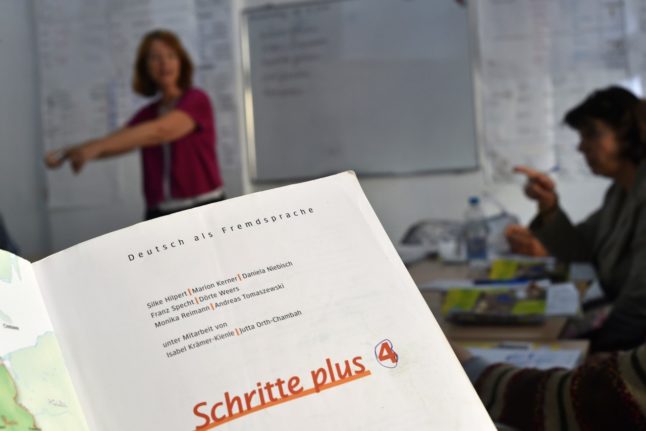There’s plenty about the traffic light coalition government’s planned citizenship reform that’s designed to make becoming German easier. The government plans to allow people to apply after five years of residency in Germany instead of eight, greenlight dual citizenship for non-EU nationals, and allow the well-integrated to apply after three years instead of the current six for fast-track.
READ ALSO: Timeline: When will Germany’s push through the new dual citizenship law?
But there’s one very notable exception – the fast-track language requirement is getting harder.
Instead of passing the currently required B2 German test, future fast-tack applicants will have to pass the more difficult C1 test.
“It’s quite a leap,” Goethe Institute language teacher Birgit Schneider told a previous episode of The Local’s podcast Germany in Focus.
READ ALSO: What we know so far about the new language requirements for German citizenship
The Common European Framework of Languages consists of six levels: A1, A2, B1, B2, C1 and C2. C1 is therefore the second-highest possible level. By contrast, the B1 German test people have to pass to apply for ‘standard’ German citizenship – both now and after the reform – is of lower, intermediate difficulty.
Schneider says B2 – which a learner gets to after B1, isn’t that much more difficult. But the transition from B2 to C1 is much harder, Schneider says, and she sees the new fast-track requirement as a clear signal that the government has an eye on academic immigration in particular.
“You have to have good nerves to enter the C1 exam,” she says, with C1 covering less everyday topics including globalisation, ‘soft skills’ in the workplace, and financial planning.
“Here, you come up with more academic and more sophisticated answers,” she says. “You need more knowledge.”
READ ALSO: How hard is the C1 language test for Germany’s upcoming fast-track citizenship?
Using the area of work as an example, B2 speakers would be able to confidently deal with most everyday situations that would arise at work – from answering the phone to arranging meetings and replying to routine emails or even applying for a job. C1 speakers would be able to push this further, typically able to give oral presentations to clients on sophisticated topics in business and economics.

Prepping for the B2 or the C1 exam
The B2 exam is more explicit in what it expects learners to do and how they answer questions. C1 speakers are expected to understand more implicit meanings and sarcasm in a wide variety of situations. To test this, the C1 exam will typically have more open-ended questions and leaves the writer with a lot more discretion on how to answer.
For example, a C1 exam may ask the writer to explain the morality of globalisation. The learner might then use whatever example they can come up with and know something about – choosing to perhaps talk about climate change, war, or labour conditions in other parts of the world – without necessarily being prompted by examiners.
By contrast, a B2 exam is likely to be far more focused in its questioning, and the expectations on the learner will be clearer.
Examiners may generally expect a B2 speaker to be more confident to talk in German about their area of expertise, and as such would be a little more tolerant of a speaker taking a conversation into comfortable territory. C1 speakers, however, are expected to be able to have complex discussions even in areas that aren’t in their field of expertise. Some studying up on a bit of general knowledge across a broader array of topics helps too.
The changes to the language requirements, however, will only apply to fast-track citizenship applications made after three years of residency in Germany. These fast-track applicants will also likely have to prove academic or professional achievement, or noteworthy voluntary commitments as well.
Applying for citizenship after a normal period of residency in Germany – currently eight years but going down to five – will still require the B1 exam and German citizenship test for most applicants.
READ ALSO:




 Please whitelist us to continue reading.
Please whitelist us to continue reading.
Member comments